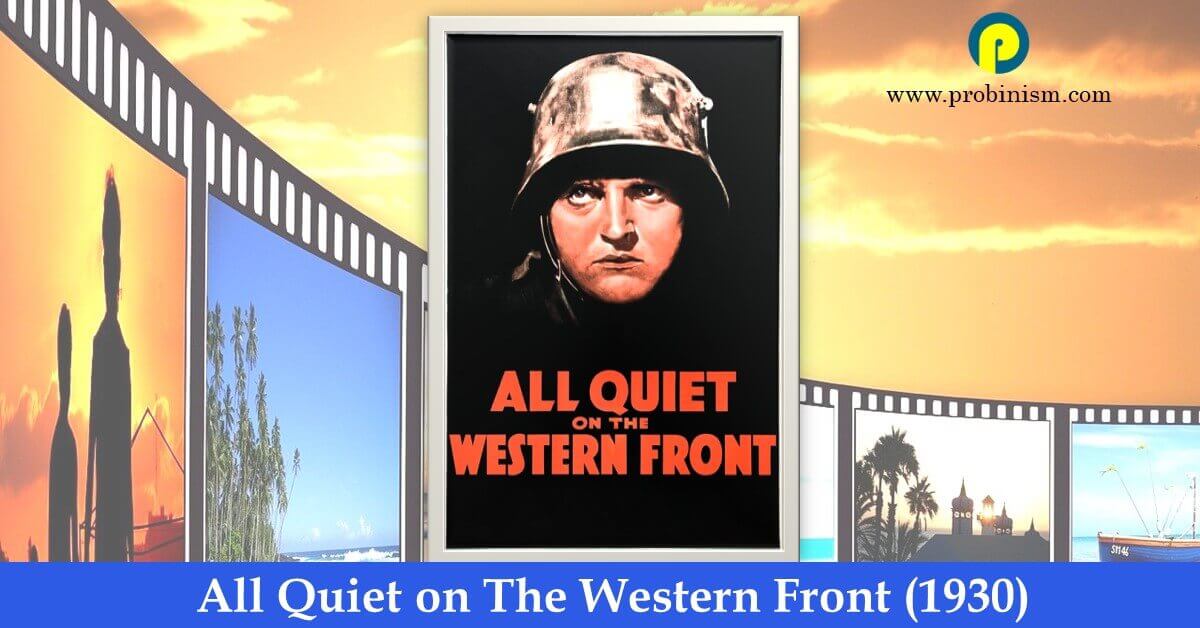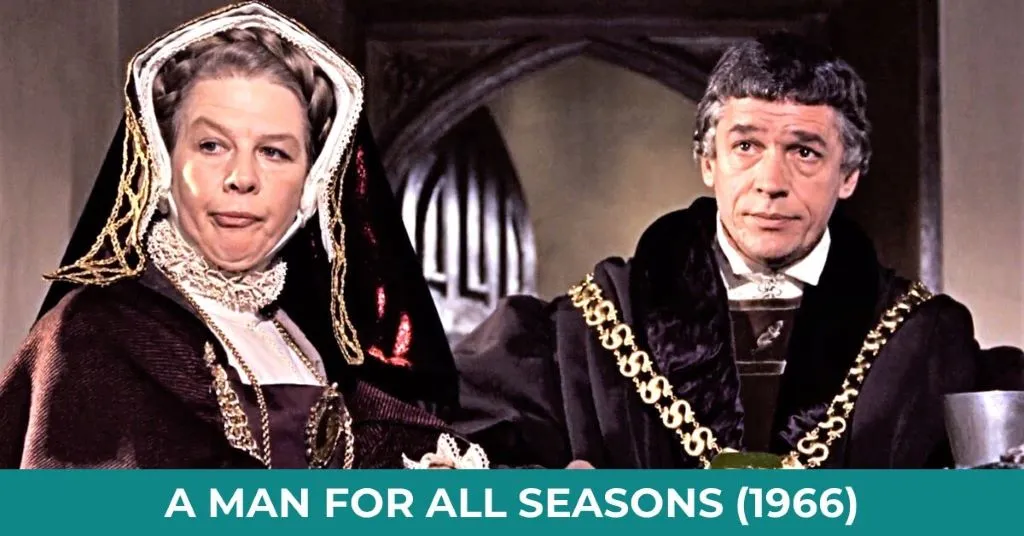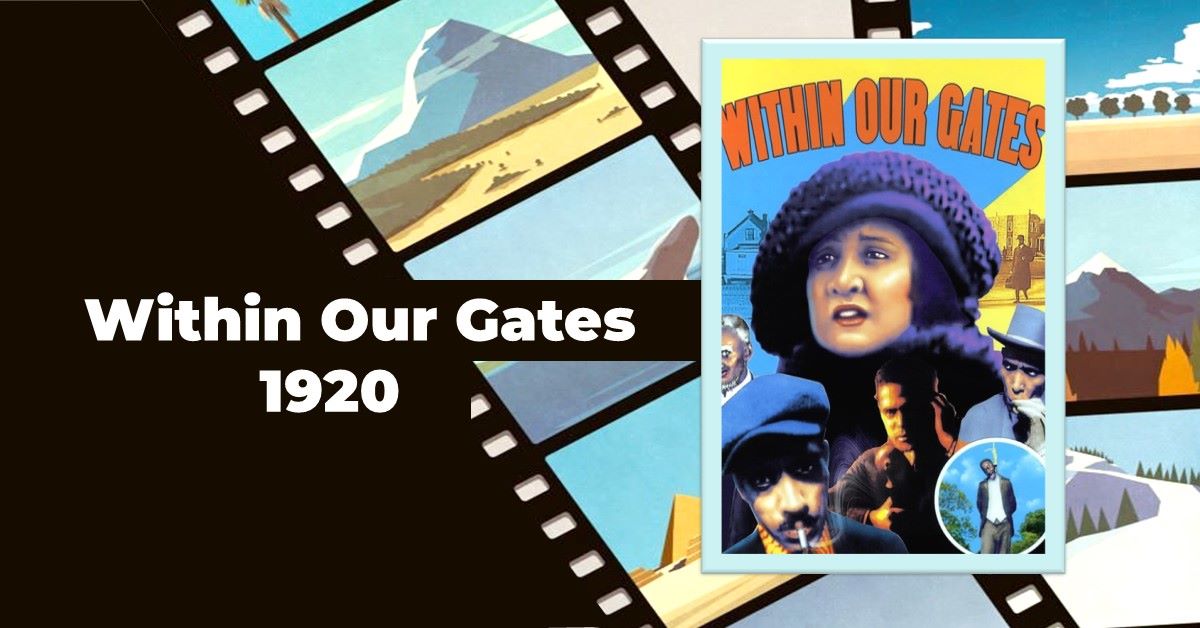Last updated on November 5th, 2023 at 11:44 am
All Quiet on The Western Front or Im Westen nichts Neues is a 1930 anti-war film based on the 1929 novel of German-American novelist Erich Maria Remarque which depicts the German-French war from 1914 to 1918 on the Western Front, the main theatre of the war during WWI.
The story is an account of casualties by one of the high school graduates, Paul Bäumer who outlived the other nineteen soldiers and eventually died minutes before the ceasefire. Moreover, with its 1979 version, 2022 is the third film that has been made to picturise the novel each with a little difference between the beginning and the final shot.
Cast by Lew Ayres (Paul), Louis Wolheim (Kat) John Wray (Himmelstoss) Arnold Lucy (as Kantorek) Walter Rogers (as Behn) William Bakewell (as Albert), Russell Gleason (as Mueller), and many others, and directed by Lewis Milestone, 2 Oscar winner All Quiet on the Western Front is one of the best films of American Film Institute, the Library of Congress added it to its Complete National Film Registry Listing in 1990, and one of the 100 greatest films movie of all time of IMDB, and one of the 101 best films I have been reviewing.
All Quiet on the Western Front was only the third film to win the Academy Award for Best Picture, and war veteran Lewis Milestone received his second Oscar for direction. Interestingly, German censors passed the film despite violent protests by Nazi groups.
Lew Ayres, only twenty-one years old, became an international star for his beautifully natural performance as the schoolboy eager to serve but disillusioned by the futility and horror of war. The final shot—a close-up of his hand reaching out to a butterfly, quivering as a gunshot cracks and falling still in death—is an amazingly poignant image.
The 2022 version of All Quiet on The Western Front puts an estimation that more than 3 million people died on The Western Front in four years while fighting to gain just a few metres of the ground. 17 million people died during WWI. In Gone With The Wind, Scarlett’s father Gerald O’Hara told her that ‘land is the only thing that lasts forever, and the only thing worth dying for.”
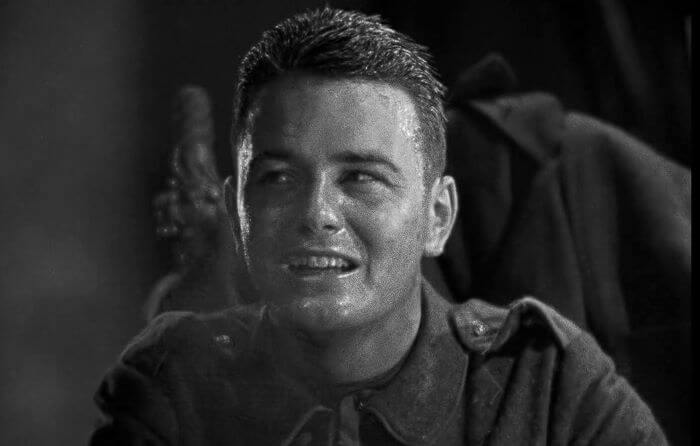
The politicians mingled the service to God with the service to the state or the emperors. They equate dying for the country with serving God. They sensationalised the death of humanity against humanity. Killing people for power and possession has always been a profitable affair and an affair of pride.
Parents took pride in sending their children to be killed or to kill. As though Voltaire deserved praise for what he said, “It is forbidden to kill; therefore, all murderers are punished unless they kill in large numbers and to the sound of trumpets.”
Human beings are deluded with the War in the name of God; war in the name of the country; war in the name of love, culture, language, sovereignty, freedom, race, and individualism.
However, what Plato said is true, that “Only the dead have seen the end of the war.” The rest just busk in dreams of glory and pride. However, its history has always been written by the winners. That was exactly what the young men felt when they were drafted to fight for their country, Germany. Being alive was the new kind of plague for them.
Paul, the last survivor describes the human ingenuity of killing each other. He narrates, “Flamethrowers. A new invention. To the list of ways by which the keenest minds in the world are making it easy for us to kill one another, add this miracle of modern industrial ingenuity. Incineration.” Staying alive was nothing but a chance in such a situation, but how many chances can a soldier outlive? “Of course, every soldier believes in Chance and trusts his luck. But no soldier outlives a thousand chances”, writes Erich Maria Remarque.
Inspired by their school teacher, Kantorek, in Germany twenty less than twenty-years-old boys enlisted for the war, during WWI when Germany was fighting against France on the Western Front when Emperor Wilhelm II, the Kaiser, was in the reign as the last emperor of the empire.
Kantorek continues, “Now, my beloved class, this is what we must do. Strike with all our power. Give every ounce of strength to win the victory before the end of the year…..You are the life of the fatherland, you boys. You are the ironmen of Germany. You are the gay heroes who will repulse the enemy when you are called upon to do so……
We have sought to make ourselves worthy and let acclaim come when it would. But to be foremost in battle is a virtue not to be despised…..let us remember the Latin phrase which must have come to the lips of many a Roman when he stood embattled in a foreign land, “Dulce et decorum est pro patria mori.” “Sweet and fitting it is to die for the fatherland.”
The rest of the boys followed Paul to see enlist him first. Behm was the one to enlist last but first to die on the frontline. During their training days, the boys were bemused to find Himilstoss as their training officer and corporal, a former postman. After the training when they were taken to the trench they met with other old soldiers and Kat, their leader. During the scarcity of food in the barrage, he stole food and fed the hungry soldiers.
One day Paul was very much heartbroken after killing a French soldier, Gérard Duval. He reasoned with himself that he would have done the same thing. When Duval was struggling with the breath, Paul reasoned, “I didn’t want to kill you…. What would you have done? I just saw your rifle…
your bayonet grenades. If we threw all those away, we could be brothers. But they never want us to know that. We each have mothers…fathers…the same… fear of death. The same…pain. The same… everything. Everything. Forgive me, comrade. I could write… to your family.” He was so devastated that he promised to live so he can meet is family or write.
Paul was broken to see how his friend died right before his eyes. He saw how severely wounded people were taken to the Dying Room who might have survived in the long run. Two of his friends became cripples, one, Detering, has no news about, might have died while trying to desert the army. In three years, he was only to survive from among his classmates.
One year before the end of the war Paul got a leave for convalescence for two weeks during which he visited his family. Back at home he felt detached from everything he had. He felt useless after spending many years in the frontline.
Later when he went back to the barrage, he said to Kat, “I’m no good for back there anymore, Kat. None of us are. We’ve been in this too long. The young men thought I was a coward because I told them that we learn that ‘death is stronger than the duty to one’s country.’ My father even wanted me to wear my uniform around. It’s not home back there anymore. All I could think of was, “I’d like to get back and see Kat again.” You’re all I’ve got left, Kat. I’m not much to have left.”
As Paul visited the school the professor told him to say something before the class. Though reluctant he was he said, “You still think it’s beautiful and sweet to die for your country, don’t you? We used to think you knew. The first bombardment taught us better. It’s dirty and painful to die for your country. When it comes to dying for your country, it’s better not to die at all! There are millions out there dying for their countries, and what good is it?
So long I thought maybe the whole world had learned by this time. Only now they’re sending babies, and they won’t last a week. I shouldn’t have come on leave. Up at the front, you’re alive or you’re dead, and that’s all. You can’t fool anybody about that very long. Three years we’ve had of it…
Four years. And every day a year, and every night a century. And our bodies are earth, and our thoughts are clay, and we sleep and eat with death. We’re done for because you can’t live that way and keep anything inside you! I shouldn’t have come on leave. I’ll go back tomorrow. I’ve got four days more, but I can’t stand it here. I’ll go back tomorrow!”
At the end of the end war, Paul was seen intrigued by a butterfly over the edge of the trench while the bullets were flying in from the enemies. Forgetful of that he tried to catch the butterfly when he got shot and fell on the mud peacefully. He fell in October 1918, on a day that was so quiet and still on the whole front, that the army report confined itself to the single sentence: All quiet on the Western Front
I feel like the 1930 version mostly focused on the severe scarcity of food, the false pride of Germans, and the glorification of war.
All Quiet on The Western Front 1979
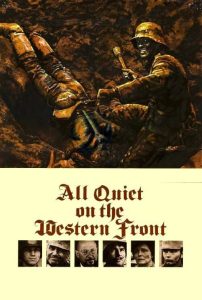
When I went through the book, I felt the 1979 version is, more or less, the accurate representation of the book. To me, it is more dedicated to showing the humane side of Paul.
However, it has more intellectual ideas than the other two versions. Apart from the beautiful exotic place it was shot, the environment and weather were marvellous along with a little romanticism. It has a few distinct features.
All Quiet on The Western Front 1979 was starred by Richard Thomas (as Paul) Mark Elliot (as Behm), Dai Bradley (as Kropp), Matthew Evans (Muller), Mark Drewry (as Tjaden), Ewan Stewart (Detering) and many others, and directed by Delbert Mann.
It starts with a brief description of the new high school graduate soldiers and classmates Stanislaus Katczinsky, the leader of our group, the 18 years old Paul Baumer, Josef Behm, who will study theology, Albert Kropp, who was to study law, Franz Kemmerich, who was to be a forester, Peter Leer, who was supposed to travel and make love, Tjaden, a locksmith before the war, Haie Westus, who dug peat for a living, And Detering, a farmer who thinks of nothing but his horses.
When a fellow soldier asked Kat about why the war was being fought, he said, Protect the Fatherland.” What are the French fighting for? asked the soldier. “Protect the Motherland.” Then the soldier asked again, “And who’s right?” “Whoever wins,” replied Kat.
Kat wisely explained the usefulness of war here to his fellow soldier, “Let me tell you, the only reason we’re fighting this war is because it’s useful to somebody.” Yes, the wars of powerful people were always fought by powerless people. Margaret Mitchell wrote, the war of the rich is fought by the poor.”
In this version, we presented are presented with something different. During his leave, Paul, he visited home to see his ailing mother and returned to the school from where he was inspired by the professor to enlist. As he dismissed the class, Paul told him that some of his classmates were dead. The professor informed that none from his class wanted to enlist. Paul left dismayed to know that none of the boys in his class wants to be Iron Heroes.
Another striking feature of the version is the fact that he could not tell his mother how he felt about his visit. Could not tell that he may not return home in the future. He went to his room and wrote the following in a letter he dared not leave for his mother to see.
“Mother, I used to live in this room. All my things are here, all my books, my beloved books, but they no longer speak to me as they used to, for I am not what I was when I lived in this room. I am a soldier. My business is not reading, it is killing. My knowledge of life is limited to death, and I know now I should never have come back. Out there, all men think as I do.
There’s no argument about the meaning of life, because it has no meaning. My companions at the front are the only truth I know. They are now my books, my family, my life. I depend on them, and I depend on nothing else. Mother… it’s a terrible thing to say, but I feel I am now going back to my real home.”
While waiting for the armistice and the war nearly ended Paul saw a bird singing on a bare tree close to the trench. He brought out a pencil and paper and began drawing the bird. When he absentmindedly raised his head off the trench edge to see the bird closely, a bullet hit his head making him collapse into the mud. The paper in his hand splashed in mud, which is not found in the book.
However, Kat was hit by a bomb while going out with Paul searching for food and died by the time Paul reached the infirmary carting him on his shoulder.
All Quiet on The Western Front 2022 or Im Westen nichts Neues
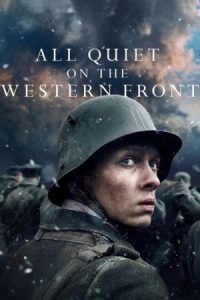
With a little alteration and addition, Netflix’s German version of All Quiet on The Western Front 2022 is another wonderful creation of it, though no idea whether we needed another All Quiet on The Western Front version.
It is mostly focused on historical facts of the war. It presents history in a crueller manner, with war and killing in a gorier style. The vivid cinematography and modern structural setting made it rather shocking. Too realistic to be real, and riveting at the same time. Especially, the scene of Paul killing Duval is capable of making me moan of pain.
All Quiet on The Western Front 2022 has been starred by Felix Kammerer (as Pual), Albrecht Schuch (as Kat), Daniel Bruhl (as Matthias Erzberger) and many others, and directed by Edward Berger
However, the question of hunger and death made me ponder much. Forced by hunger, Paul and Kat were thinking of breaking in a house to steal food, Kat asked Paul, “What do you think, Paul? Is it worth dying for?” “It is when you’re hungry”, replied Paul.
After the abdication of Emperor Wilhelm II, Germany constantly tried to bring peace through a ceasefire. But France delayed the process. However, General Foch signed the deal to be effective from the 11th hour, on the 11th day of the 11th month, 1918.
When both sides signed the armistice at the end of the war took effect from the 11th hour, on the 11th day of the 11th month, Kat went out looking for food. They broke into a farmer’s house while Paul was on guard outside the wall. The farmer shot at him when discovered his presence. Though escaped from the house, he was shot by the seven years old farmer’s son who traced him in the nearby woods. By the time Paul carried him to the camp he was dead.
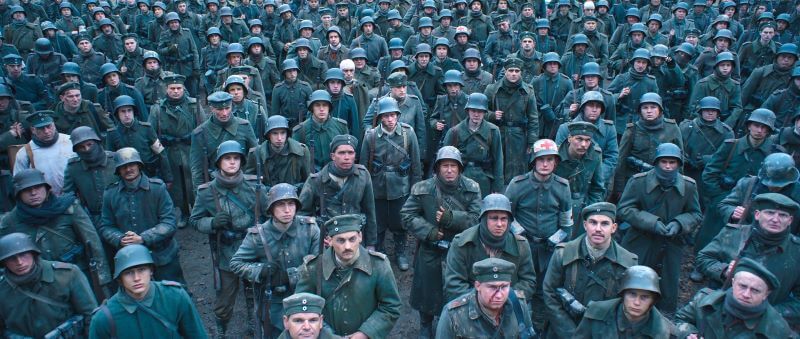
The ceasefire agreement took place after multiple requests from the German side. But before the ceasefire became effective the emperor ordered to recapture of Latierre plains before 11 a.m. and to end the war with a victory! When the soldiers went back to the bunker and fought Paul was killed by a French soldier, who stabbed him on his back while others chased him to the bunker right at the moment the ceasefire took effect.
The historical facts this version presents are exceptional, going beyond the book. We see Matthias Erzberger to meet with the French general Marshal Foch for the armistice. Matthias Erzberger, who was a civilian politician rather than a soldier, headed the German armistice delegation became an integral part of the legend of the “stab in the back”.
This legend’s theme was that the German Army was “undefeated in the field” and had been “stabbed in the back”—i.e., had been denied support at the crucial moment by a weary and defeatist civilian population and their leaders. In fact, that is what we see in the 1930 and 1979 versions where the school teachers complained about people being grappled by defeatism.
The German Army General Friedrichs blamed Social Democrats for its defeat. Adolf Hitler eventually became the foremost of these political agitators, branding Erzberger and the leaders of the Social Democrats as the “November criminals” and advocating militaristic and expansionist policies by which Germany could redeem its defeat in the war, gain vengeance upon its enemies, and become the preeminent power in Europe.
The casualties of World War I were surpassed those of previous wars: some 8,500,000 soldiers died as a result of wounds and/or disease. The greatest number of casualties and wounds were inflicted by artillery, followed by small arms, and then by poison gas.
War was increasingly mechanized from 1914 and produced casualties even when nothing important was happening. On even a quiet day on the Western Front, many hundreds of Allied and German soldiers died. The heaviest loss of life for a single day occurred on July 1, 1916, during the Battle of the Somme, when the British Army suffered 57,470 casualties.
Similar uncertainties exist about the number of civilian deaths attributable to the war. It has been estimated that the number of civilian deaths attributable to the war was higher than the military casualties, or around 13,000,000. These civilian deaths were largely caused by starvation, exposure, disease, military encounters, and massacres.
Conclusion
Either to entertain or inform the generations about the fault line of the First World War or any war in that sense All Quiet on The Western Front serves both purposes. However, the 2022 version won Oscar awards in three categories: Cinematography, International Featured Film and Production Design in 2023.
